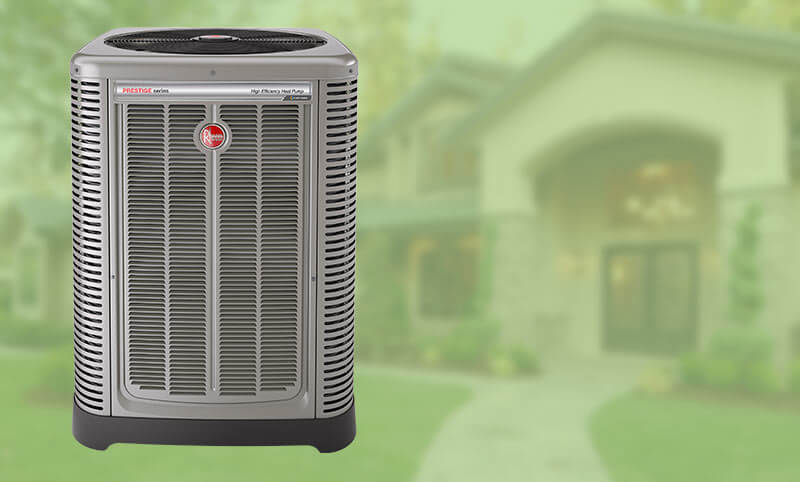Heat pumps are a great solution if you’re looking for ways to lower your energy bills and reduce your impact on the environment. These low-maintenance systems act as efficient all-in-one ACs and heaters. Aspen Aire provides expert heat pump installation in Des Moines, Ankeny and all of central Iowa. And if your system isn’t working correctly, we also offer heat pump service and repair.
Heat Pump Rebates and Tax Savings
You may be eligible for federal tax credits for installing a heat pump, and MidAmerican Energy customers may be able to take advantage of rebates on new heat pumps. Contact us for a free quote and to learn more.

Benefits of Heat Pumps
- Use 20-60% less energy
- Less fossil fuel use
- Federal tax credits and rebates available
- Virtually no carbon emissions
- Minimal maintenance
- Low operating cost
- Heat and cool evenly
- Use one system for both heating and air conditioning
Professional Heat Pump Installation in Des Moines
Aspen Aire Heating & Cooling is a trusted HVAC company in Des Moines providing heat pump repair, installation and service. We’ve been serving Polk County and Central Iowa since 2006. We’re proud to be a Rheem Pro Partner and our HVAC technicians are fully trained and licensed.
Heat Pumps We Carry
Just like furnaces and air conditioners, heat pumps vary in efficiency. To compare different models, check their HSPF (Heating Seasonal Performance Factor) and SEER (Seasonal Energy Efficiency Ratio) ratings.
Carrier Comfort™ Series Heat Pumps
- Energy-Efficient Heat Pump
- Up to 15.0 SEER
- Up to 9.0 HSPF
Carrier Infinity Series Heat Pump
- Extra-Efficient Heat Pump
- Two-Stage
- Up to 19.0 SEER
- Up to 9.5 HSPF
Carrier Infinity 20 Heat Pump with Greenspeed Intelligence
- Ultra-High Efficiency Heat Pump
- Variable-Speed
- Up to 20.0 SEER
- Up to 13.0 HSPF
What Is A Heat Pump?
A heat pump is an energy-efficient complete air conditioning and heating system in one that keeps you comfortable through every season.
Types of Heat Pumps
Standard or Air Source Heat Pumps
Standard heat pumps transfer heat to and from the outside air. They use the same refrigerant as air conditioners for this process.
Geothermal or Ground Source Heat Pumps
Geothermal heat pumps transfer heat to and from the ground, below the frost line.
How Does A Heat Pump Work?
Heat pumps work by moving heat energy from one place to another. Depending on the type, this could mean pumping warm air from inside a building to the outside air or pulling heat from the ground and into the building.They don’t actually generate heat or cold air; that’s what makes them so energy efficient.
Cooling Mode
In the summer, a heat pump works like an air conditioner to cool your home by extracting heat from the air inside the home and transferring it to the air outside. Unlike a central air conditioner, there’s no condenser to cool the air.
Heating Mode
During the winter, there’s still some heat in the outside air even when it feels cold to us. A heat pump pulls this heat out of the air and moves it inside to heat your home, unlike a gas furnace which uses a burner to heat the air.
In mild climates, the outside air may provide enough space heating to keep a house warm all winter. In Iowa and other middle and northern U.S. states, supplemental heat may be required on extremely cold days. In these cases, an electric heater usually provides heat. Heat pumps are so efficient that this process generates 2 or 3 times more heat than the electricity it uses.
Frequently Asked Questions
Do heat pumps work in cold climates?
This is a question we get asked a lot, especially with the notoriously frigid winters here in Iowa. The good news is, today’s heat pump technology makes them good at heating homes even in cold climates where temperatures drop below zero. However, in cases of extended arctic blasts like we’ve seen in the past few years, a backup heating system is useful for providing emergency heat.
How much does a heat pump cost?
They may cost a bit more up front compared with the price of just a furnace or an air conditioning unit, but if you need a completely new HVAC system there may not be as much of a difference in price. Installation costs depend primarily on the type and size, as well as how complex it is to integrate one system instead of installing two separate units.
Will a heat pump really save me money?
For most homeowners, yes. With an energy efficiency that’s 3-5 times better than traditional air conditioner and furnace systems, heat pump cooling and heating costs could be several hundred dollars less per year. In fact, the U.S. Department of Energy states the average savings on your utility bills could be more than $500 per year.

